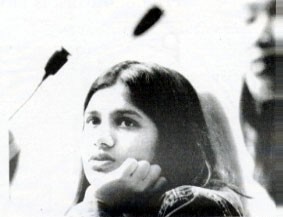 |
"Avanti
Ghanekar of Lynbrook High School
in San Jose" |
"Here we are in the legislature, but who gets
to ultimately decide whether or not the term limits law, passed
by the people of California, is constitutional?" he asked.
Several students spoke out in unison: "The
judiciary."
Liebert went on, asking the high schoolers
what they know about secret settlements. "Product recall?" said
one.
"Firestone?" asked another. Liebert described
pending legislation which would do away with secret settlements,
"a really huge issue in California right now."
Later, across the street, the students sat in
rapt attention in the ornately carved, wood paneled Third District
Court of Appeal, listening to Burt Pines, the governor's judicial
appointments secretary, and Pauline Weaver, chair of the State Bar's
Commission on Judicial Nominees Evaluation (JNE). They explained what
it takes to be a judge and explained how judges are selected for
appointment. "We're looking for the best and the brightest,"
said Pines. "And we're looking for diversity - not just of
gender or race but of background."
Pines could have been describing his audience,
many of whom want to be judges or lawyers. The gifted group are the
first participants in the Legal Heritage Institute, a program
sponsored by the Foundation of the State Bar to introduce students to
lawyers, judges and the law. Selected on the basis of a statewide
contest, each applicant submitted a 1,000-word essay on "The Law: My
Rights and Responsibilities."
The winners were rewarded with an
all-expenses-paid, activity-packed week of meeting with judges and
lawyers. Each student received a scholarship ranging from $1,000 to
$4,000 and their schools received $1,000. The foundation underwrites
the new program with $80,000.
In addition to two days in Sacramento,
participants visited historic northern California sites in the gold
country, toured courthouses and met with former California Supreme
Court Justice Cruz Reynoso and Justice Art Scotland, presiding judge
of the Third District Court of Appeal. "Read, read, read and write,
write, write," Scotland advised the youngsters.
The foundation launched the program with the help
of retired teacher and former high school and college football coach
Edwin Sowash, a Windsor resident, who traveled the state seeking a mix
of schools to participate in the first-time effort. "I went where I
knew people, where I had personal contacts," said Sowash. "I
wanted to make sure to include Santee High School to help somewhat
mitigate the effects of this year's shootings there."
Sowash contacted 49 schools and collected 39
essays, which were reviewed by a program committee and whittled down
to the final 16.
The students' sometimes weighty and erudite
perspectives on the law and legal issues belied their years as they
wrote more like college students rather than the high school seniors
they are this fall. They touched on topics ranging from the Code of
Hammurabi to the Mayflower Pact to Thoreau's Civil Disobedience.
Okasana Ivashchenko of Nevada Union High School
in Auburn compared the American jury system with jury selection in her
native Russia, where only professional business people are called to
serve. Avanti Ghanekar of San Jose's Lynbrook High School contrasted
the poverty of her native India to the bounty of the United States and
warned that Americans should not take their advantages for granted in
an essay entitled, "Obligations of the Individual."
The week in Sacramento at the end of July
reinforced most of the students' desire to become lawyers. "I have
always wanted to be a lawyer as long as I can remember," said
Ivanshchenko, who works at a law office. "Eventually, I aspire to
become a judge though. This week I had the honor to meet great lawyers
and judges who were so kind to take the time out of their busy
schedules."
Ghanekar agreed that because of the program, "I
am definitely more inclined to become a lawyer or a judge because I
heard from people who seemed to enjoy their career and found it
worthwhile." The San Jose resident plans to go into engineering,
product patent or cyberlaw. "I hope to go to Harvard Law School in
the future because it is important to establish yourself in the law
profession by making a good impression," he said.
Julia Lauper, a student at Lincoln High School in
Stockton, wants to follow in the footsteps of her father, a San
Joaquin County public defender. "After this program, I am more
interested in the profession - partly because I am more aware of the
flaws of the legal profession and the problems that need solutions,"
she said. Lauper plans to major in molecular biology with a minor in
classics or political science before entering law school.
The Legal Heritage Institute was the brainchild
of foundation executive director James Pfeiffer, who said the
foundation has been awarding scholarships since 1992, but mostly for
students entering or attending law school. He wanted to develop a
program for high school students that combines California history and
political science from a legal perspective. After two years of
planning, Pfeiffer submitted a proposal to the California Department
of Education in October and received its blessing in January.
"We're excited that it's a high school
program," Pfeiffer said. "There are plenty of programs that
support mathematics and the natural sciences. Our new effort is a
splendid program which covers the humanities, social sciences and the
law." Pfeiffer and Sowash plan to expand the program to include more
of California's high schools.
Both men hope this year's participants take to
heart Drew Liebert's parting advice: "Expose yourself to the
possibility of doing something remarkable. It doesn't matter what
your politics are. It matters what your commitment is." |

